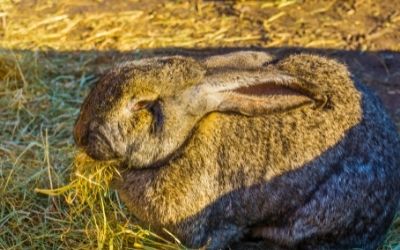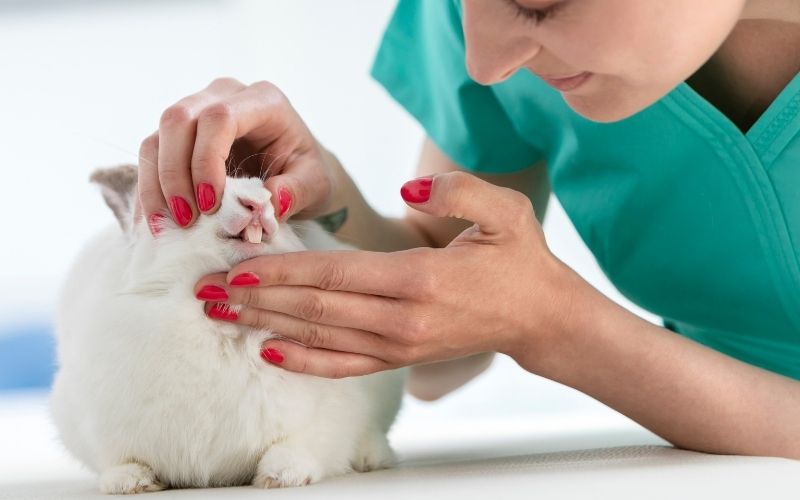For humans, missing a tooth can be very difficult. Not only do you not have the ability to chew your food properly, but it can also cause some speech impediments. If that’s not enough of a reason, there are also risks involved with tooth decay and even gum diseases if the tooth that fell off left behind its roots!
To make matters worst, if you lose a tooth as an adult, it’s permanent!
But what about rabbits? If a rabbit loses a tooth, does it grow back?
Yes, rabbits are capable of growing their teeth back. In fact, their teeth grow continuously throughout their lives. However, your rabbit may be at risk because a broken tooth may result in an infection if the inner structure of the tooth is exposed. This is extremely dangerous for your rabbit’s health and you need to know what to watch out for when you notice it.
Jump to...
The rabbit’s teeth
Start with looking into your rabbit’s mouth. First of all, be careful, it might bite. Try to lift its lips to see if you can find any anomaly.
The jaw and teeth of a rabbit are pretty complex. The two front teeth are called ‘incisors.’ In fact, rabbits have about 6 of them inside their mouths. The rest of the teeth laying in the back are called molars and are meant for chewing.
Rabbit teeth are known as “open-rooted” because they are ever-growing and that’s perhaps a good thing for survival reasons. Unfortunately, this also means that they are constantly chewing or gnawing on something to wear it down so that it doesn’t grow out of control. Because it will.
One of the most common reasons for rabbits to experience a broken tooth is due to constantly gnawing on things and not getting the appropriate balance of nutrients in their diet.
The interesting fact here is that only the incisors are the teeth that continue to grow. They are the knives that help rabbits cut through long pieces of food like carrots for example. The front incisors are the ones that need to be trimmed.
A second interesting fact is that the front incisors are like plants with roots. If you happen to remove the roots of either, the plant and teeth will not grow back.
How to tell if you’re rabbit is suffering from a broken tooth
Your rabbit won’t often come to you when there’s a problem. In case you’ve noticed that it’s been looking a bit off lately, consider the following signs of a broken tooth:
Hard time chewing
If your rabbit is eating less than normal and seems to have a hard time chewing on its food, this could be a sign that something is wrong with its teeth. It’s also possible that there’s an obstruction in the mouth preventing it from opening wider to chew its food.
You might even see rabbits prefer eating pellets because pellets are softer than hay.
Swelling around the mouth
If you can’t find any abnormalities, but your rabbit’s mouth has been swollen lately, it could be suffering from an infection. In other words, there could be bacteria and they might be having trouble fighting it.
This can be due to many reasons but a broken tooth is likely the issue. A broken tooth can expose the insides of the tooth to bacteria and cause infection.
Does not have energy
If it has some trouble moving or jumping around. Your rabbit might be sluggish and overall tired. This can mean that your rabbit hasn’t been eating well and that there are some dental issues that need to be addressed.
Feces that look different from before
If your rabbit use to have normal-looking feces and then all of a sudden, you gradually see it change or morph into something entirely different, the problem may have to do with food. If your rabbit doesn’t get the right balance of food and nutrients or is having trouble chewing its food, it will show in its feces.
You might have noticed that it takes a lot of effort in chewing hay and hay is an extremely important part of a rabbit’s diet. Pellets might be easier to chew and so this imbalance of food might contribute to the change in feces.
Nasal and eye redness and discharge
There can be a number of reasons why your rabbit may be showing signs of nasal and eye discharge. Having runny eyes and a snotty nose is often the symptoms of an infection. At least for rabbits, this is commonly due to a respiratory tract infection. Other times, it can also be due to a mouth infection due to a broken tooth.
Rabbits also like to use their front paws to clean their nose and face. A lot of this discharge can be visible on the fur of their paws.
Why did my rabbit’s tooth break?
There are a lot of reasons why your rabbit’s teeth might have broken and some of them might actually be surprising to you. Let’s talk about a few of the major reasons and what we can do to prevent it from happening in the future.
Malnourishment can weaken your rabbit’s teeth
Rabbits chew and gnaw on their food for a reason. You might think it’s because they’re bored or have the urge to bite something that provides them with a lot of satisfaction. And A lot of chew toys can aid in keeping your rabbit mentally stimulated.
While this may be somewhat true, the biological reason might be due to the fact that their incisors are always growing. Chewing and gnawing on things can help shave away at their incisors while they grow to produce a balanced length.

If a rabbit’s diet didn’t have the right balance of vitamins and minerals, its teeth may suffer. Giving your rabbit a good amount of hay (85% of its diet), pellets (5%), and leafy green vegetables (10%) may be the key to keeping its teeth healthy and strong.
Poor genetics can weaken your rabbit’s teeth
This issue might not be something you can fully control. If a rabbit is poorly bred, it can have a host of illnesses which include but are not limited to weak bones and teeth.
Unfortunately for your rabbit, this is something you might have to speak to your veterinarian about. Laying out a plan of action regarding treatment to food that your rabbit eats may be the best course of therapy.
Accidents can break a rabbit’s tooth
If your rabbit happens to bump into something hard and breaks a large chunk of its tooth, it can lead to really big issues. Depending on how much of the tooth broke off and how much of the cavity is exposed, days from now, the situation can lead to a pretty serious infection.
Try to watch out for the signs and symptoms explained above.
I recommend rabbit-proofing your home not just for the safety of your possessions, but also for the safety of your rabbit.
It doesn’t even have to be an impact accident, it can happen if your rabbit chews on something too hard (like their metal cage) causing its tooth to suddenly break. While this is considered appropriate to shave down the length of a rabbit’s teeth, if too much breaks off at one time, it would lead to something serious.
They can also get their teeth stuck on something and that too can contribute to major damage if they pulled away and broke off the tooth.
Your rabbit’s incisors were too long
It’s important to know that rabbits must chew and gnaw on things like hay and toys to grind down their ever-growing teeth. If they aren’t given this opportunity, there’s a likely chance that their teeth may end up getting very long.
If left unchecked, they can grow beyond the comfort of the rabbit’s mouth and possibly piercing or hurting the rabbit’s gums. They will also become more flimsy and susceptible to breaking. This is similar to people with long nails. The longer your nails, the higher your chance of accidentally breaking them. When a nail breaks close to the nail bed, a person will feel excruciating pain. This is what can happen to a rabbit’s incisors if they get too long.
What to do if your rabbit has broken a tooth
First of all, take care to check if your rabbit is actually suffering from a broken tooth. If it is, what should you do?
See if there are any signs that the tooth has fallen out naturally. Baby rabbits have baby teeth and when they get older, those baby teeth fall out to make room for adult teeth which should last the lifetime of the rabbit.
Baby rabbit teeth typically fall off after a few months but it also varies between breeds as well. If your baby rabbit is only a few months old and missing some teeth, this could be the reason why.
If this isn’t the case, hopefully by now you know your rabbit intimately enough because you’re going to want it to allow you to look into its mouth.
Now, I want to add that it’s important to bring your rabbit to the vet annually so that they can get a thorough teeth check-up.
I suggest checking every 1 to 2 weeks at a time.
Step 1: Massage and pet your rabbit’s head
So what you want to do is simply pet your rabbit and give it some nice massages round the head area across the cheeks.
Step 2: Feel for the teeth bumps behind the cheeks
Feel the cheeks and try to see if both sides feel normal. Try to feel for the tooth bumps and for anything that’s out of place as your fingers move through the cheeks. You’re looking for the bumps that make up the sides of the teeth. You can also check for any abscess while you’re there.
Step 3: Check the incisors
Then start looking at their incisor teeth by petting from their nose and pulling gently back. This will open their upper lip and expose their front incisors. Here, you just want to take a glance at these incisors.
If you want to learn more about your rabbit’s teeth, check out PDSA Veterinary Charity for more information about rabbit dental health.
What does the veterinarian do to fix a rabbit with a broken tooth?
If your rabbit came in with a broken incisor, chances are a veterinarian will assess how bad the damage is. If there’s no harm to the rabbit, the vet will probably try to trim down the longer incisor to try to get both teeth to even out.
They will often use a rotary tool like a Dremel to shave off the excess length of the longer tooth.
The bottom line
It’s important to understand the fact that rabbit incisors do grow continuously and that they require hay and toys to gnaw on to keep their teeth from getting too long.
Be sure to check on your rabbit’s teeth at least every 2 weeks to make sure they’re healthy, and that you’re doing everything you can to keep them healthy.
Dental health is surprisingly one of the biggest issues that come with owning a rabbit. Be prepared to identify the signs and symptoms of a rabbit that has dental issues.
Other interesting articles:
